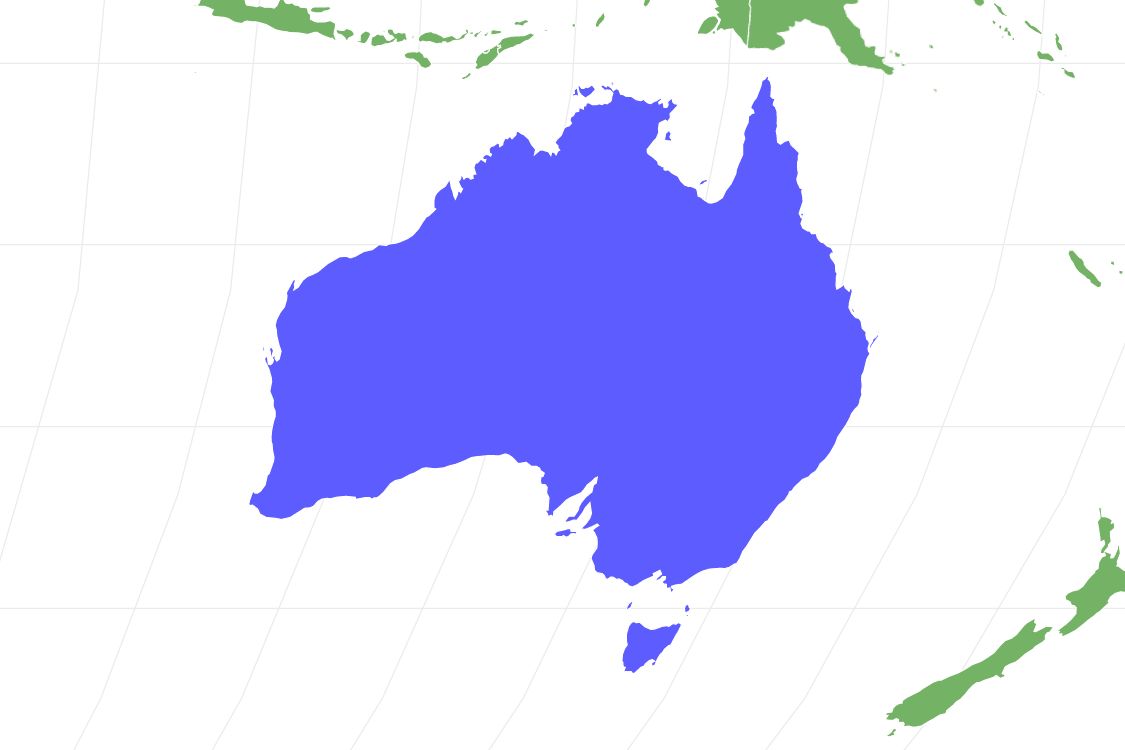Koolie
Canis lupus
The name "koolie" comes from the German mispronunciation of "collie."
Advertisement
Koolie Scientific Classification
- Kingdom
- Animalia
- Phylum
- Chordata
- Class
- Mammalia
- Order
- Carnivora
- Family
- Canidae
- Genus
- Canis
- Scientific Name
- Canis lupus
Read our Complete Guide to Classification of Animals.
Koolie Conservation Status
Koolie Facts
- Fun Fact
- The name "koolie" comes from the German mispronunciation of "collie."
- Temperament
- Quiet, energetic
- Diet
- Omnivore
Koolie as a Pet:
- General Health
- Energy Level
- Shedability
- Trainability
- Intelligence
- Tendency to Chew
- Size
- Family and kid friendliness
- Yappiness / Barking
- Low
- Separation Anxiety
- Moderate
- Preferred Temperature
- Warm climate
- Exercise Needs
- High
- Friendly With Other Dogs
- High
- Pure bred cost to own
- $1,000
- Dog group
- Herding
- Male weight
- 35-55 lbs
- Female weight
- 30-50 lbs
This post may contain affiliate links to our partners like Chewy, Amazon, and others. Purchasing through these helps us further the A-Z Animals mission to educate about the world's species.
View all of the Koolie images!
Koolies can have a different nose and eye colors, as dogs with darker coats have darker noses and eyes and lighter coats have lighter noses and eyes. They can even have blue eyes, but blue eyes are associated with deafness.
The Koolie, also called the Australian Koolie, Coulie, Welsh Heeler, Welsh Merle, German Koolie, or German Collie, is a herding dog from Australia. Existing since the early 19th century, among its ancestors were the Black and Tan Collie from Scotland, the smooth-coated blue merle Collie from Britain, and possibly the German Tiger. At some point, it was bred with the Australian Dingo, while some bloodlines were also bred with the Australian Kelpie and Border Collie. The Australian Dingo cross resulted in a breed with high heat tolerance, great stamina, stout build, manageability, and a very short coat.
See all of our expert product reviews.
It is believed that the Koolie got its name, according to a local legend, from German immigrants in southern Australia who were unable to pronounce “collie”.
Today, the intelligent, patient, loyal, upright, task-seeking working dog with a great eye and peripheral awareness is popular among dairy farmers, graziers, and stockmen, who use it for herding livestock in the rural Australian outback, as well as active people who enjoy it as a companion dog.
The 32 Different Types Of Koolies And Koolie Mixes
The name “German Koolie” is a misnomer since the Australian Koolie was bred from an Australian Dingo and a German Koolie or Collie from Germany, Ireland, or Scotland, and perhaps also a German Tiger.
Today, it is not recognized as a standardized breed by any major kennel clubs, but it is recognized as a breed by the Australian Sporting Registrar and the Australian National Kennel Council. It is a cross-breed or collie mix all on its own, and there are many popular collie mixes. However, the Koolie Club of Australia defines it as a breed based on its working ability, with several types:
Color patterns
Health and Entertainment for your Koolie
See all of our expert product reviews.
- Merle: Red or blue
- Solid: Red, brown, or black
- Bi-color: Red/white, black/white, black/tan, red/tan
- Tricolor: Solid or merle colors, often with a white chest and tan points.
Coat types
- Short
- Short rough
- Smooth
- Short/smooth
- Medium
- Double-coated
- Single
- Wavy/long (rare)
There are also different sizes of Koolies depending on where in Australia it was bred and the stockmen’s needs. The tall ones are north of Queensland and New South Wales, shorter and thicker ones in the Hunter Valley region and Snowy Mountains of New South Wales, and the smallest in Victoria.
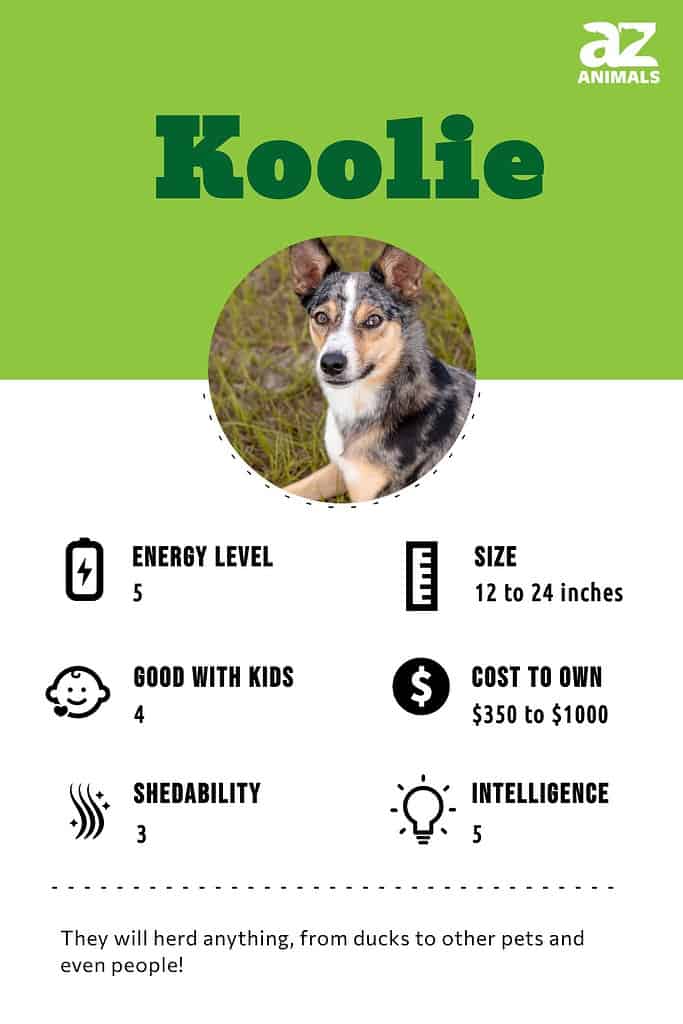
3 Pros And Cons Of Owning Koolies
| Pros! | Cons! |
|---|---|
| It can do several different tasks. This hard-working breed not only herds livestock but excels in dog sports, including obedience, agility, herding, and flyball, and can be trained for therapy, rescue, and detection. | It needs space. Although it’s a medium-sized dog, the Koolie is not suited for isolation or small apartments. |
| It makes an excellent companion dog. This breed is loyal, patient, and intelligent, making it great for active people and older children. | It’s not for average or sedentary lifestyles. The Koolie is a highly active breed and needs an owner who can walk them several times a day and exercise them, preferably someone working from home. |
| It’s not a barker. When compared to other dog breeds, Koolies only engage in barking occasionally. | It needs work. In addition to everyday exercise, this breed does best when its owner gives it tasks to do. A house with a large yard, homestead, farm, or ranch will allow it to thrive and go through training and jobs to help you out. |
Size And Weight
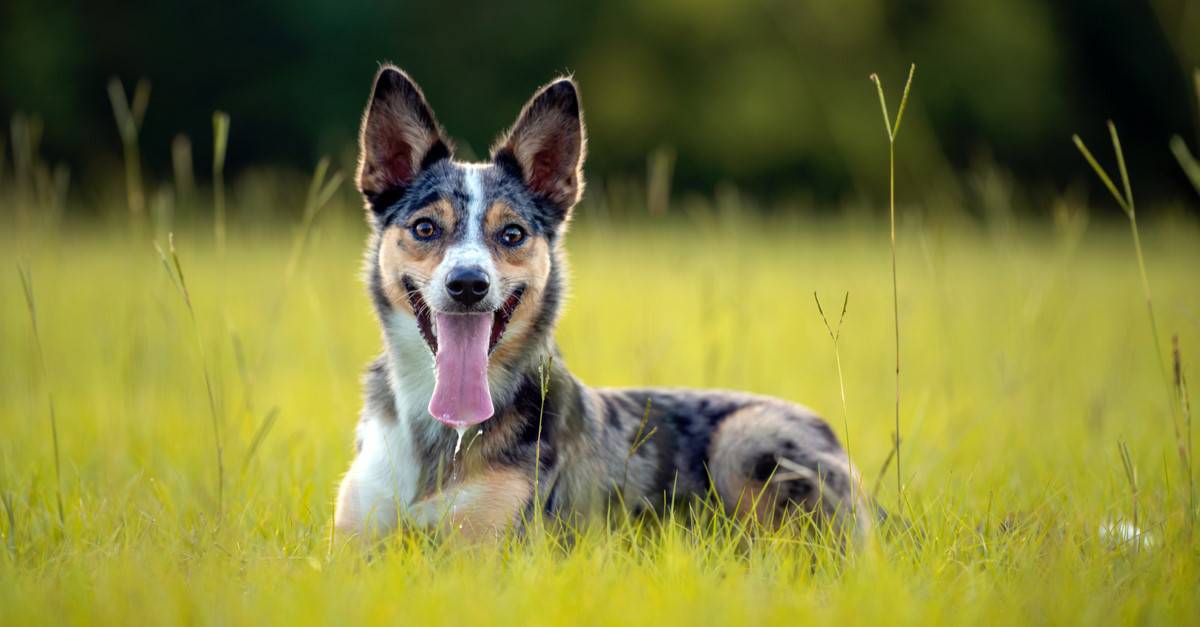
Koolie, Australian working herding dog, is a medium-sized short hair dog.
©TanyaCPhotography/Shutterstock.com
The Koolie is a medium-sized short hair dog with an average height of 13-24in (46-60cm) and an average weight of 30-55lbs (13.6-24.9kg) fully grown for both sexes. Males and females do not significantly differ in size. Koolie puppies weigh 5 lbs on average at 8 weeks of age and are typically fully grown in height at 12-15 months, usually reaching their adult weight 6 months later.
| Height (male) | 13-24″ |
| Height (female) | 12-24″ |
| Weight (male) | 30-55lbs, fully grown |
| Weight (female) | 30-55lbs, fully grown |
Common Health Issues
Koolies are a highly athletic breed. In spite of their genetic diversity, they do face some possible health issues due to having a small gene pool. The merle gene can cause blindness and/or deafness, so responsible breeders will have merle testing before breeding their dogs. Joint problems from athleticism are a likely problem that increases with age. Allergies of the skin in reaction to chemicals including herbicides such as roundup can range from minor to seizures, but allergies are not exclusive to this breed. Koolies are generally fairly healthy. In sum, the top health issues Koolies face are:
- Blindness and/or deafness due to merle gene
- Joint problems
- Chemical allergies
Temperament
The Koolie temperament is generally described as obedient, loyal, friendly, quiet, and patient, with an upright and intelligent personality. Koolies are energetic, hardy, playful, hard-working pets who get along with people, children, other dogs, cats, and other pets. They do not have a large barking tendency, unlike some other breeds. True to their working dog group, they will herd anything. They will even herd people and children when they don’t have a task. The herding instinct is displayed by gentle nipping at the heels.
How To Take Care Of Koolies
Koolies need specific care due to their breed and athletic or working dog needs. Possible health concerns like joint problems or questions about their medium size and coat are all factors one must consider.
The Best Dog Food For Koolies
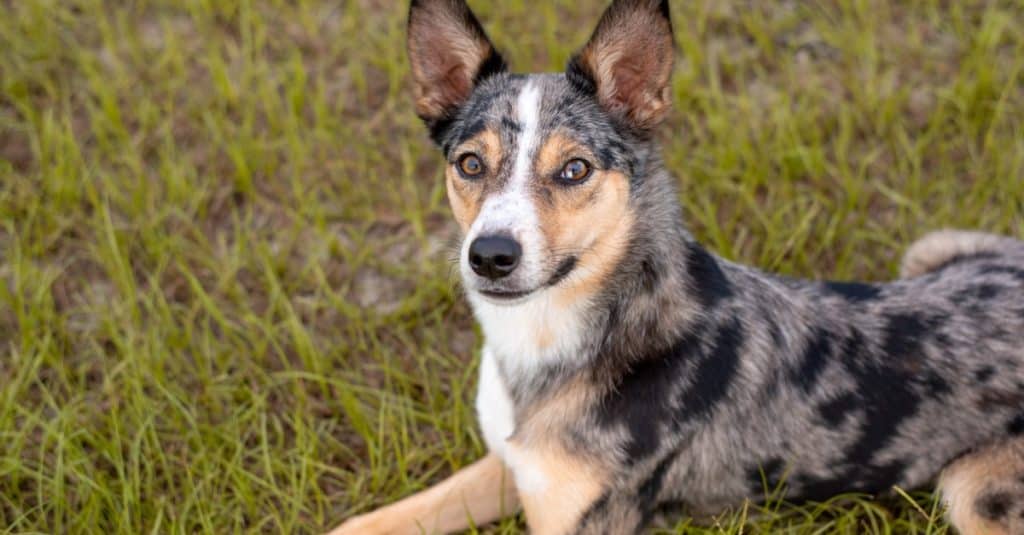
Koolies have unique health needs compared to other dog breeds.
©Tanya Consaul Photography/Shutterstock.com
Koolies, especially puppies, have their own unique health needs compared to other dog breeds. New owners should consider the following tips when choosing food for their new pet:
Koolie puppy food: Premium quality puppy food for dog breeds of medium size will give your Koolie puppy the nutrition it needs. Those 8-12 weeks old need to eat four meals a day, while 3-6 month-old puppies need 3 meals a day. Puppies 6 months to 1 year old need two meals a day until they reach their first birthday, after which they can usually have 1 bowl a day. Sometimes, it is better to feed them 2 lighter meals. Be careful about overfeeding them.
Koolie adult dog food: Premium dry dog food for medium-sized, active, or working breeds gives well-rounded nutrition, although you can mix it with broth, water, or canned food for extra hydration. You can also feed your adult Koolie a diet of cooked eggs, fruits and vegetables, and cottage cheese as long as they are no more than ten percent of their diet. You’ll also still want to be careful about overfeeding to prevent obesity.
Since Koolies often have sensitivities to certain chemicals like the herbicides that may be in their dog food, which can cause allergic reactions, Koolie owners should consider getting organic dog food.
A-Z Animals’ recommendation for the best dog food for Koolies is Castor & Pollux Organix Grain-Free Dry Dog Food Organic Senior Recipe.
Though this dog food is geared towards senior dogs, we love its glucosamine and chondroitin content for keeping super active Koolies’ joints moving so they can stay their most active and life-loving selves. As this product is USDA-certified organic, it’s free from synthetic chemicals such as pesticides and fertilizers. So you and your Koolie will no longer have to worry as much about irritating, chemical-related allergies.
Pick up a bag of Castor and Pollux Organix Grain Free Senior Dog Food on Chewy or Amazon.
- Made with organic, free-range chicken as the first ingredient accompanied by organic sweet potatoes.
- USDA organic certified chicken dog food containing no artificial preservatives, flavors or colors
- Organic flaxseed, blueberries and sweet potatoes provide extra nutrition and health benefits in a mouthwatering meal.
- Organix provides complete and balanced organic diets for your faithful and precious pooch.
- Organic dog food made without corn, wheat, soy, chickpeas or lentils.
Maintenance And Grooming
Koolie breeders tend to specialize in different coats or offer a variety. That being said, Koolies generally have short coats regardless of texture, so grooming is often easy and no more than average requirements. They are average shedders and only need occasional brushing and bathing when necessary. If their coat is short enough, they may only need a grooming glove instead of a brush. Otherwise, for longer coats, you’ll want to brush them a few times a week and bathe once a month.
Training
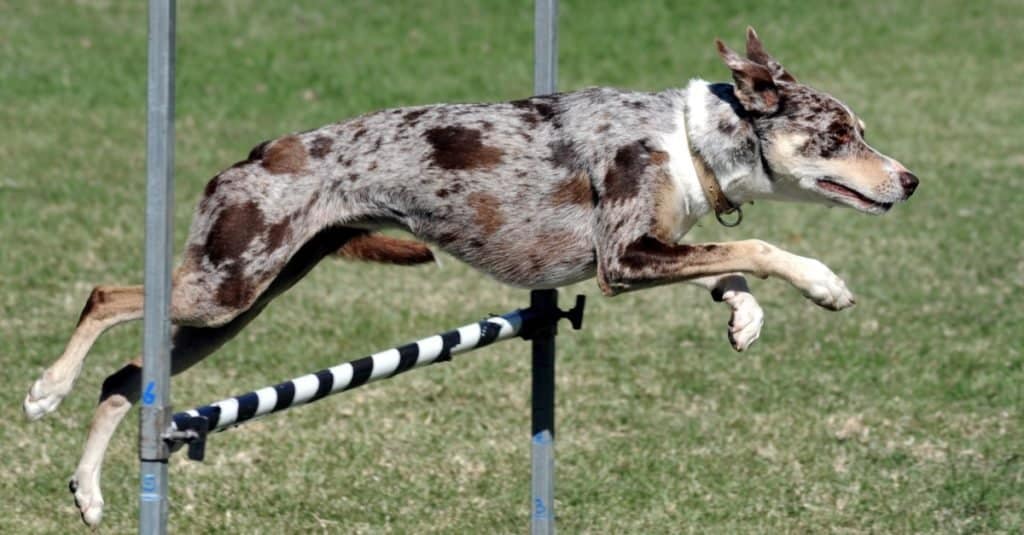
Koolie enjoying an agility challenge.
©Zenotri/Shutterstock.com
Koolies are great with active single people or active families with older children, especially in a house with a yard. They have a natural tendency to herd anything from livestock, birds, people, and children.
Exercise
High on the list of Koolie’s needs is exercise. Just like with puppies of any other breed, you’ll want to limit their exercise to 5 minutes for every month of age. As adults, however, Koolies need walking several times a day along with some form of stimulation or task to work both their bodies and their minds. Exercise should be at least an hour every day.
Puppies
Koolie puppies will display their natural herding instinct with soft nipping. They take well to obedience training and socialization.
Koolies And Children
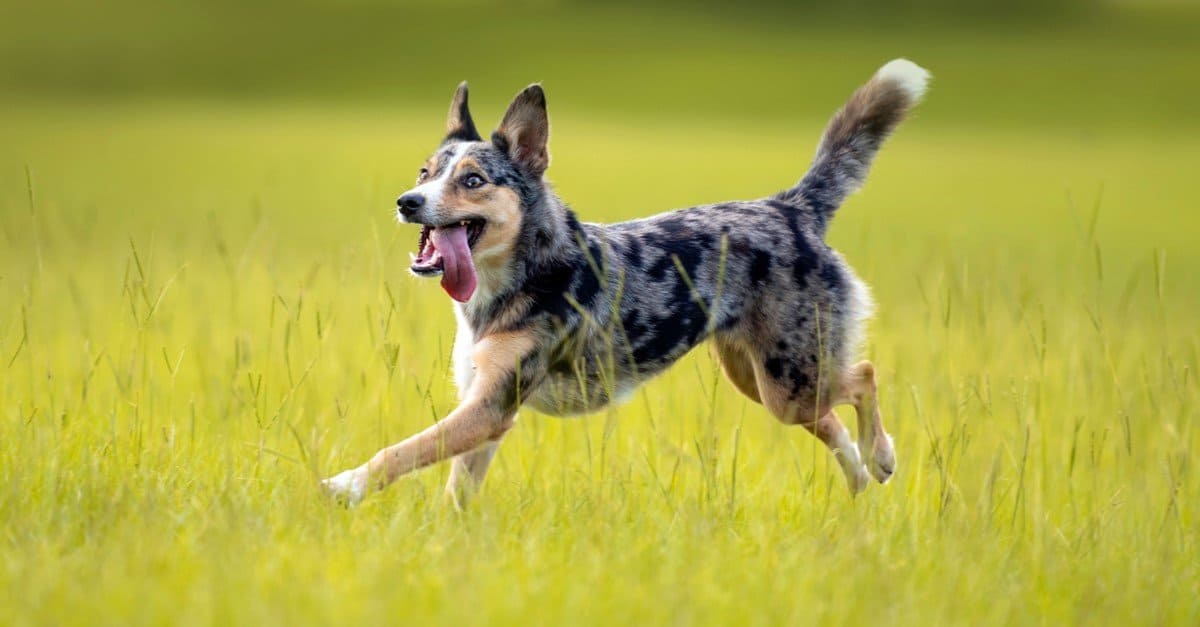
Koolie dogs may play too roughly with young children and are better suited to families with older children.
©TanyaCPhotography/Shutterstock.com
Like any other dog breed, Koolies should never be left unsupervised with young children, who may play too roughly with them. They do best with older children.
Dogs Similar To Koolies
Dog breeds that are similar to Koolies are the Border Collie, the Black and Tan Collie, and the smooth-coated blue merle Collie.
- Australian Kelpie: Along with the Border Collie, this breed was crossed into some Koolie bloodlines. It has a similar personality, build, and working ability.
- Australian Cattle Dog (Red or Blue Heeler): The Koolie was used for developing this breed, which has similar personality traits, build, working ability, and coloring.
- Australian Shepherd: The Koolie is an ancestor of this breed, and distantly related to it. Another sheepherding dog, it is more territorial, with a destructive tendency when bored and higher maintenance.
Popular Names For Koolies
Some examples of popular names for Koolies are:
- Hunter
- Zorro
- Lightning
- Blue
- Ace
- Blitz
Famous Koolies
The story of Red Dog was about a Kelpie/Cattle Dog crossbreed who searched the harsh land for his owner who had died without his knowing. Many people in the town of Damper helped him, but he always moved on. Finally, he returned to Damper and went to his owner’s girlfriend (Nancy), later dying at his owner’s gravesite. The people of Damper created a statue of him in respect of his spirit.
View all 77 animals that start with KKoolie FAQs (Frequently Asked Questions)
Do Koolies make good pets?
Yes, Koolies make excellent companion dogs.
What breeds make up a koolie?
The Koolie was bred from a Black and Tan Collie, a smooth-coated blue merle Collie, and perhaps also the German Tiger.
Is a Koolie the same as an Australian Shepherd?
No, although the Koolie is thought to be an ancestor of the Australian Shepherd. The latter has a different coat and some differences in personality traits and temperament.
How much does a koolie cost to own?
Breeders have different prices depending on the type of Koolies they are breeding, the breeders’ location, reputation, litter size, demand, puppy/dog age, training, and socialization efforts. Some Koolie puppies cost $1,000 from a breeder. You can also get a Koolie from a Koolie rescue for the adoption fee, which is about $350.
How long koes a koolie live?
Koolies live 12-18 years, but 15 years on average.
Thank you for reading! Have some feedback for us? Contact the AZ Animals editorial team.
Sources
- Wikipedia, Available here: https://en.wikipedia.org/wiki/Koolie
- Dog Breed Info, Available here: https://www.dogbreedinfo.com/koolie.htm
- Dog Lime, Available here: https://doglime.com/koolie/
- American Kennel Club, Available here: https://www.akc.org/expert-advice/health/when-does-my-puppy-finish-growing/
- Pet Care Tips, Available here: https://animalcaretip.com/how-to-take-care-of-your-koolie/
- Pet Guide, Available here: https://www.petguide.com/breeds/dog/koolie/
- Australian Koolie Rescue, Available here: https://australiankoolierescue.com/faq-about-akr/
- Allambie Koolies, Available here: https://allambiekoolies.wixsite.com/allambiekoolies/for-sale

